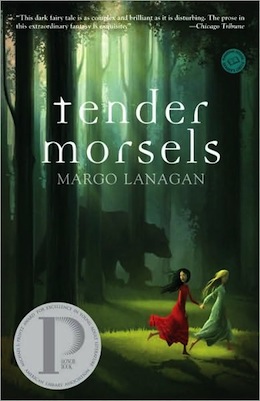This is the story how one of my favorite novelists, Margo Lanagan, first came to my attention. Lanagan is a “writer’s writer,” which means the many excellences of her work have a great deal to teach the rest of us writers. I’ll talk some about that too, how new fiction comes to be assembled from the building blocks of prior works.
Sometime in 2010, I became aware of the controversies raging in a corner of the science fiction/fantasy bibliosphere I knew nothing about: young adult literature. “YA is wretched, poor stuff, and the young people reading it will be ruined for good books!” “No! YA is the long-awaited return of joy, action and clarity to fiction, and, indeed, the salvation of us all!” “Actually, it’s the adults who shouldn’t be reading YA. O shame, shame, shame!”
Wow, I thought: with the opinions all so extreme and contradictory, I’d better read some of this YA stuff like pronto, and see for myself! So I bought three YA fantasy titles that were getting a lot of buzz around then, and began reading.
The verdict? Well, the first book, which I won’t discuss further, was … not so good, I thought. The second—also to be skipped quickly past—was, eh, not so bad. The third, Tender Morsels by Margo Lanagan, was devastating, and marvelous, and the best book I read that year. On the strength of Tender Morsels, Lanagan catapulted into the pantheon of five or so writers whose newest title I’ll always snatch right off the shelf and buy immediately, not even bothering to glance at the back-cover copy. Three years ago, as a birthday gift for turning the big 4-oh, my mother took me to a tiny Puerto Rican island in February—and, believe me, that’s right where you want to be, and when, as a New Yorker—and for months beforehand, I saved Lanagan’s most recent novel, The Brides of Roll Rock Island, to read there with undivided attention. That book was a highlight of the loveliest vacation of my life.
What makes a Lanagan novel so damn good?
Well, for one, she has a marvelous ear for dialogue; and moreover—a talent and capacity I particularly appreciate—Lanagan has a deep command of demotic English, and weaves dialect throughout her novels to sumptuously enriching effect. Pretty inevitably, when writing at the far edges of their abilities, authors will hit the doldrums of doubt. While writing The Sorcerer of the Wildeeps, I questioned whether I was even allowed to put such unadulterated strains of African American Vernacular in a piece of otherwise straight-ahead sword-and-sorcery fantasy. Was there any chance I might do it well—do justice both to the real life antecedents, and the fantastical construct? Although Margo Lanagan and I make recourse to vastly different dialects of English in our writing, nevertheless I took heart from how assuredly and unapologetically Lanagan lays the highest and lowest registers side-by-side, capitalizing on what each can best communicate. After the doubt-wracked struggles of getting down the first hundred pages of The Sorcerer, I might not have found the wherewithal to write the final hundred without the example of Tender Morsels shining before me.
Good “world-builders”—those writers who can dazzle us with magic and monsters—come a dime a dozen in fantasy. But many fewer are the writers who can build, not static societies, but plausibly volatile ones: imagined cultures in which the past ceaselessly acts on the present moment, which the future always and unpredictably contravenes. And hardly any author forgets to throw in a romantic entanglement or two, but infinitely rarer are the writers who pay more than just lip service to how inseparably beholden we all tend to be to the locales and people of our upbringing. For good or ill, most of us carry home and family with us forever, everywhere. The Brides of Rollrock Island is a stunning display of Lanagan’s ability to work on these multiple levels simultaneously, with an entire community serving as protagonist through singular characters playing out their unique stories, the big picture always evolving based on whatever hopeful or horrific choice any given individual makes. I don’t think I ever consciously leaned on the precedent of The Brides of Rollrock Island while writing The Devil in America, but it certainly didn’t do me any harm to have read Lanagan’s novel with so much enraptured attentiveness beforehand.
My brief was “a 1000 words or less,” and here we are nearing 800, and I haven’t even touched on the cathartic darkness of Lanagan’s work yet …! So let me touch on that and close. I’m calling “cathartic darkness” that class of consolation available only from fiction that attends to life’s most painful aspects without flinching. For sure, Lanagan does not stint showing the evil men and women inflict upon one another, but she’s particularly good about conveying how our individual psychologies—how each unique character (mis)apprehends what is permitted, correct, and desirable—create the inescapable jail in which this one lives, or that one’s wondrous sense of freedom. Her books really are as good as fiction gets; I commend them to you.
Kai Ashante Wilson’s stories “Super Bass” and “The Devil in America,” the latter of which was nominated for the Nebula, the Shirley Jackson, and the World Fantasy Award, can be read online gratis at Tor.com. His story «Légendaire.» can be read in the anthology Stories for Chip, which celebrates the legacy of science fiction grandmaster Samuel Delany. His latest novella, The Sorcerer of the Wildeeps, is available now in paperback, ebook, and audio format. Kai Ashante Wilson lives in New York City.










